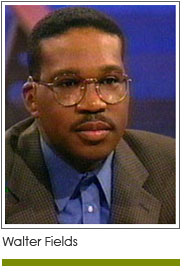 The tales of Illinois Governor Rod Blagojevich is not unique to the “Land of Lincoln,” but is becoming an increasingly regular commentary on the state of electoral politics and government. If the allegations contained in the complaint against the governor are true, the sheer arrogance he has demonstrated in office is deserving of the highest penalty under federal sentencing guidelines. To hear the charges as detailed by U.S. Attorney Peter Fitzgerald is to visualize an elected official whose sole concern is self-enrichment.
The tales of Illinois Governor Rod Blagojevich is not unique to the “Land of Lincoln,” but is becoming an increasingly regular commentary on the state of electoral politics and government. If the allegations contained in the complaint against the governor are true, the sheer arrogance he has demonstrated in office is deserving of the highest penalty under federal sentencing guidelines. To hear the charges as detailed by U.S. Attorney Peter Fitzgerald is to visualize an elected official whose sole concern is self-enrichment.
We have been down this road. Far too many times. While Illinois is the butt of jokes today, my home state, New Jersey, certainly has its own rich history of greed and corruption in state government. Politicians in my state have made corruption a cottage industry and were so crooked that they turned an unknown lawyer, U.S. Attorney Chris Christie, whose qualifications to serve were questioned by the major newspaper here when he was first appointed, into a prospective gubernatorial candidate. I have always said our state seal should be a greasy palm given the manner in which our politicians have engaged in “pay to play.”
All jokes aside, the Blagojevich exercise should be a cautionary tale to voters. Sadly, it appears the people of Illinois have been burned by two consecutive governors, in a bipartisan fashion. Their previous governor, Republican George Ryan, was toppled by scandal and sits in a federal prison. Now Democrat Blagojevich appears headed toward a similar fate. All the while voters put their faith and trust in both men to serve honorably in office. If you need any evidence as to why the public remains cynical, despite the euphoria of the recent presidential election, you need not look any further than the rogue gallery of elected officials who have abused their power.
There are some real practical implications when politicians in positions of power, such as governors or mayors, steal. It usually results in bad public policy or decision making that is solely based upon the degree to which an action further serves the politician’s self-interest. Take for example the allegation that Blagojevich threatened to strip a children’s hospital of state funds if the CEO did not come up with a substantial campaign contribution. Had an action like that occurred, under the guise of some other issue, untold numbers of children might have been impacted. If it had been business as usual the public would have never known. It is this type of shady behavior that imposes a significant “corruption tax” on all of us. We pay for the misdeeds of these corrupt elected officials in the form of diminished services, outright elimination of programs, higher taxes and fees to cover graft, and the loss of public trust in government.
The public deserves better but won’t get it until it demands it. Like consumers, we get what we vote for. In too many of these cases there were early warning signs but they were ignored in the partisan fervor of a campaign or blind devotion to a political party’s appeal. It seems in all of these cases the accused was on a slippery slope and political insiders, if not the general public, knew it long before formal charges were filed. What I am suggesting is that it’s up to voters to demand more; to hold elected officials accountable. No. I am not talking about some idealistic desire to see our government officials function as role models, though they should. I am simply suggesting we need to better scrutinize their record when in office, scour their campaign finance statements and question their activities when they appear to be going against the public’s interest.
Hopefully, voters in Illinois will be spared the drama of this scandal. If Blagojevich has any shred of decency left, he will resign his office. Yes, he is presumed innocent until proven guilty but his persona is such that you can’t help but believe somewhere down the line he’s got an orange jumpsuit in his future.














